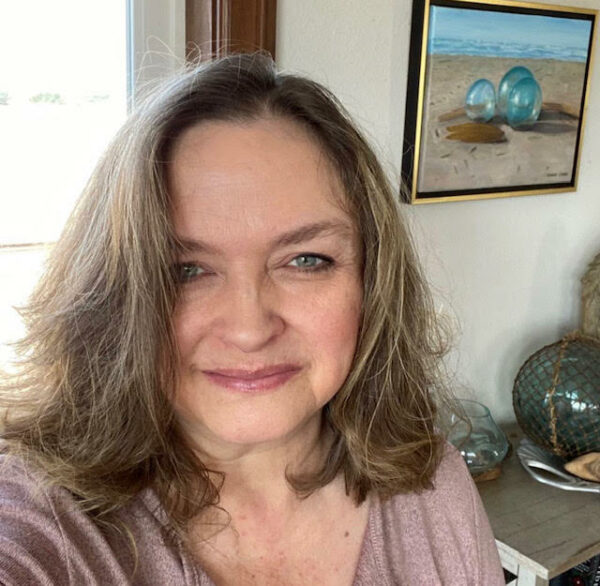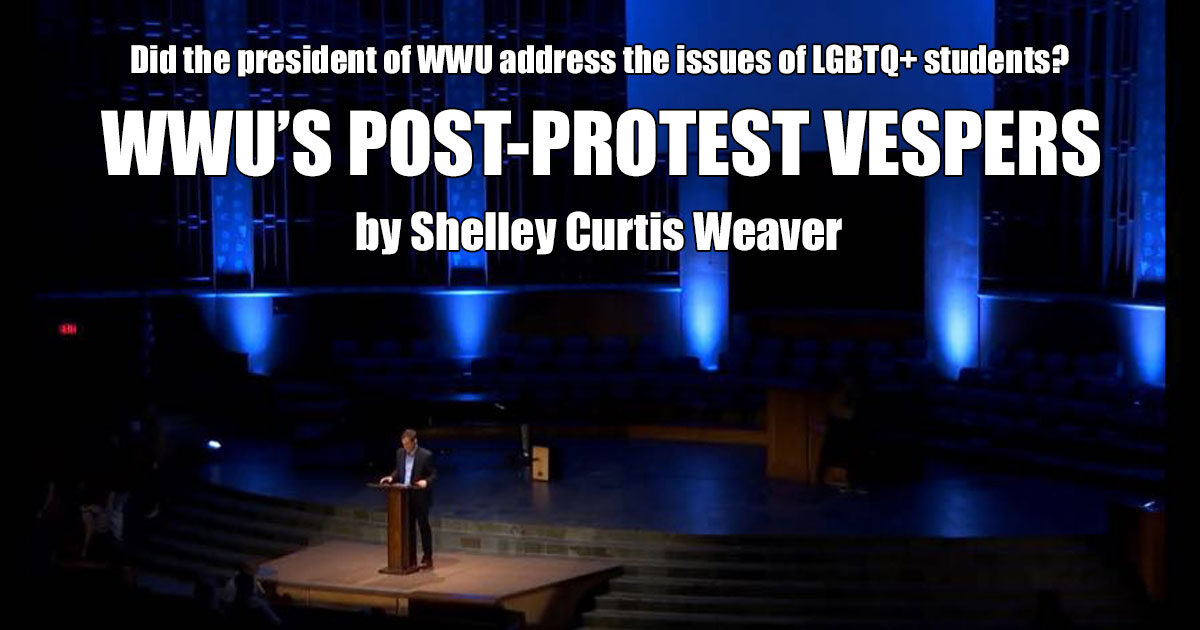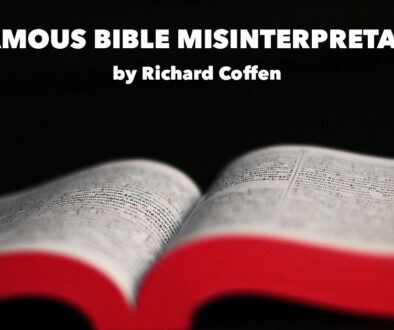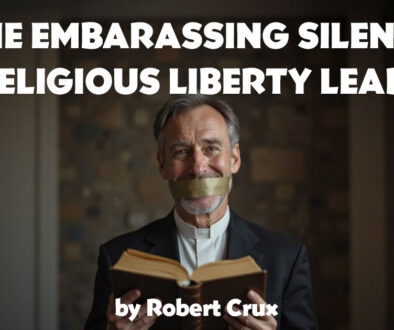A Reflection on President Alex Bryan’s Post-Protest Vespers at Walla Walla University
by Shelley Curtis Weaver | 8 May 2025 |
Now seems to be the time to talk about it.
Alumni Weekend at Walla Walla University (WWU) is over. The former students and prospective donors have flown or driven home. The WWU newspaper, The Collegian, has now published their response to a March 14 vespers program, where President Alex Bryan addressed student election controversy and a campus-wide walkout and protest.
I’m glad to see it—but I’m sorry if they were asked to wait.
We have followed the story as it unfolded. The university’s social media has been flooded with gay pride flag emojis in the comments sections, and press coverage has spread beyond quiet campus conversations. A feature by Northwest Public Broadcasting shared the statement they received from a WWU administrative spokesman:
“While we seek to create a welcoming and supportive environment for all students, we expect of our campus leaders a heightened advocacy for and modeling of Seventh-day Adventist beliefs and behaviors.”
As a WWU alumnus, and the parent of three others, I watched the March 14 vespers in part to clarify the accuracy of the reports I’d heard and read.
The vespers program began with beautiful student-led music and singing. Afterwards, WWU president Alex Bryan’s address was the emotional centerpiece of the service. As Bryan described the “difficult week on our campus,” it was clear he had wrestled and sorrowed over the decisions made. I also shed some tears during that portion of the address.
Reflection or delay?
President Bryan did not bring up specifics about the university’s decision to prevent a gay candidate from running for student association president, despite there being no specific school policy to restrict such a candidate, and no other candidates on the ballot. In fact, despite saying, “I think naming reality here is helpful,” President Bryan did not discuss the issue of LBGTQ+ student leadership at all.
Bryan did, however, describe the divided opinions to be expected in Adventist schools which also accept students who are not church members. He spoke at length about the university’s obligations to its students, and at even greater length about the school’s obligations to the complex network of constituents, boards, conferences, unions, and broader world church to which the university answers. As he concluded, President Bryan painted a compelling picture of what it might mean to become a community committed to living the teachings and leading of Jesus.
I was oddly shaken by it. Bryan said we must engage in a rigorous and loving conversation about this issue in order to grow—and remain intact—as a church community. I felt uncomfortable with his optimistic description of a community able to offer some “yeses” to young people and the LGBTQ+ community, instead of perpetual “nos.”
Is it even possible?
These are strange feelings to have during an appeal for the exact type of community I absolutely desire as an Adventist follower of Jesus. Ultimately, the discomfort springs from one nagging question—how is that conversation ever to happen here?
I do not mean “here” as in Walla Walla University, which heretofore has appeared to tolerate a more open and accepting posture towards diversity within the church. I mean “here” as in the entire world church at large. “Here,” in the sense of our General Conference (GC) administration and the force— via threat, surveillance, and the “discipline” (punishment) it unleashes on any entity or person “out of conformity.” This practice blocks all theological, academic, or rational approaches other than the historicist tradition.
Institutional caution
It’s no accident: for the past eighteen months, General Conference president Ted Wilson’s sermons and speeches have railed against historical-critical theological research and the LGBTQ+ community. Why do these two draw his focus? What might be revealed if linguistic analysis, Roman military history, and Roman common law entered into our discussions? Might Paul’s policies about homosexual men in the early church be revealed to be about pedophiles and predators instead? Might Jesus praising the centurion’s faith and healing his “favorite young man” change the way we “follow Jesus” on the LGBTQ+ issue?
It’s also no accident that marginalized, vulnerable groups are always asked to bear the weight of denominational immaturity. Those requesting women’s ordination were similarly cajoled during the GC vote in 1995 and 2015. We were told “Just wait; the world church is too shaken by this issue, but they will come around.” Two weary decades later, not much growth or change has happened. Instead, punishment and censure is more likely.
At what cost?
Are Adventist church leaders, and the world church at large so fragile that we must shelter them from growth or change? Are they at risk of physical attack or harm? Of shame or suicide?
These are real risks in the LBGTQ+ community, and that risk is heightened by the rejection of the church.
Are we truly asking for patience because some regions of the world church “are not ready” for that conversation? Or are we concerned about alienating our harvest field? Do we worry our baptismal numbers would drop if we asked members to be tolerant, committed to study, consideration, and change? Do we worry that tithes would decline?
Perhaps if we could suddenly baptize thousands of LGBTQ people on a single Sabbath, church leaders would have an inclusion epiphany.
A church for young Adventists?
Understandably, President Bryan wishes for more peaceful and fruitful conversations. However, the atmosphere we’ve maintained doesn’t allow for such. Asking LGBTQ+ Adventists and allies to be patient while the church moves at a glacial pace on this issue means they will continue to be frozen out. It’s cold-hearted to tell our young people they are the future of the church but deny them a voice in shaping what the church will be.
James and Ellen White and their peers were young when they broke with the status quo of their churches. With the value Adventists place upon breaking free of religious ideology that is merely “the traditions of men,” we might be among the clearest voices on this subject. Our theological experts and scholars might help uncover helpful insights. We might join others in ending what remains a cruel bigotry among mainstream Christian denominations.
Our options
President Bryan had some thoughts on how our denomination compared to those other churches as well. He emphasized the fact that our denomination, unlike any of the others around us, has not fractured or divided, despite our differences.
I would sadly offer that this is only true because we have been content to hemorrhage instead of breaking. And our General Conference leadership appears to take despicable pleasure at the bloodletting by referring to members leaving as “the shaking” and cheering it on as only another hopeful sign of the second coming.
March 7-14 was an undeniably difficult week for Walla Walla University. But we’ve made it a tough lifetime for LGBTQ+ people who believe in Jesus and seek to be part of the Adventist community. I do not envy Alex Bryan and his administrative staff the daunting task of starting compassionate and productive conversations. I do wish for a more frank admission about where our church’s power and priorities lie.
Most of all, I wish we could be like Jesus. Bryan’s description of the diverse community Jesus collected is the beating heart of discipleship. Yet to omit the direct and passionate Jesus who spoke and acted against religious abuse is to follow only in part. I wish we would emulate Jesus by calling out leaders who place heavy burdens on the backs of suffering people. I wish we could turn over tables of greed (for money, power, or baptisms). I wish we could freely discuss dreams where the people we’ve called unclean and have rejected, stand clean in the eyes of God. I wish we could talk old wineskins and new wine.
 Shelley Curtis Weaver lives in coastal Washington state. She is a clay-artist, writer, wife, mother, grandmother, and a frequenter of Columbia River crossings. She has edited and contributed to The Journey to Wholeness addiction recovery curriculum from AdventSource.
Shelley Curtis Weaver lives in coastal Washington state. She is a clay-artist, writer, wife, mother, grandmother, and a frequenter of Columbia River crossings. She has edited and contributed to The Journey to Wholeness addiction recovery curriculum from AdventSource.
To comment, click/tap here.




